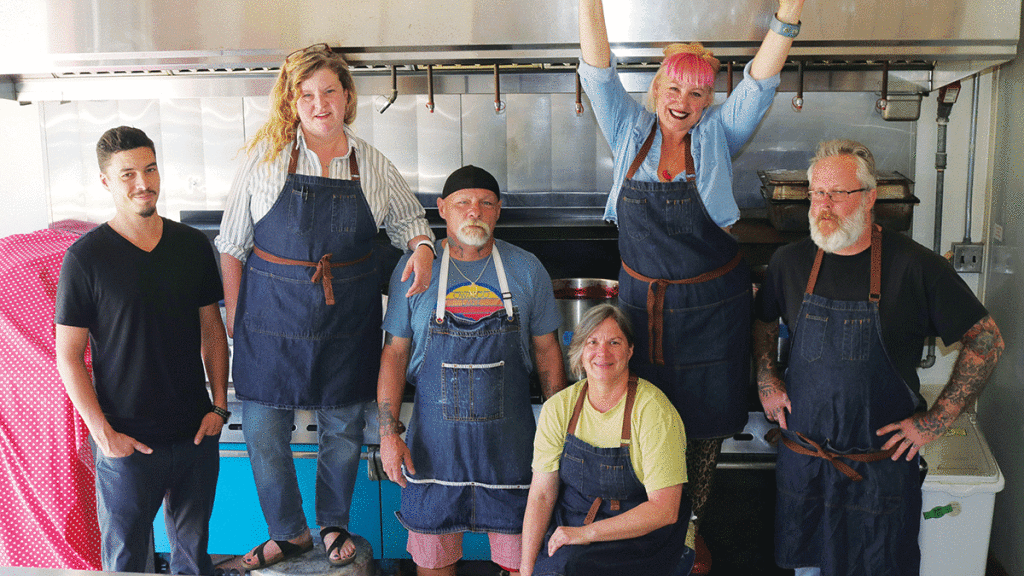It’s no surprise that Tabitha Stroup is cooking up something new, different and delicious. Stroup is one of the longtime culinary queens of Santa Cruz. She started her career in the Dream Inn kitchen in the early ’90s, then to other venues and projects—notably Friend in Cheeses Jam Company. But Stroup is moving on from her national brand, which she started in 2011.
“Friend in Cheeses is doing her thing—she’s still competing with the Smuckers of the world, but she’s doing good,” Stroup says. “That was my vanity project, but now my focus is on something else.”
That something else is Terroir in a Jar, a co-packing company focused on small farms and sustainability. The project started as an “aha” moment for Stroup, when she realized that she could help extend the life of not only bruised, ugly or unsellable products, but also the farmers behind them.
Around 6 billion pounds of fruits and vegetables, more than 40% of all produce, are wasted every year in the U.S., according to a 2012 report by the Natural Resources Defense Council. Often it is because of appearance—scrapes, bruises and irregular shapes. With more than 40 million Americans experiencing some level of food insecurity, the fact that nearly half of all fruits and vegetables are thrown away is horrific.
“The bruised, too-juicy, aftermarket produce that the open market isn’t going to buy—that is the end of the financial train for those, for that farmer. It probably didn’t even cover a portion of what it took to bring that produce to market,” Stroup explains. “So I was like, ‘How can I turn that around for the farmers, where they can have a diversification of offerings—legal products that they could sell on the open market to stores, Amazon or their CSA while helping educate the public about sense of place—which is what terroir means.”
Fluctuations in weather and temperature can be disastrous for farmers, especially for sensitive fruits like berries. The Central Coast is a strawberry region, and heavy late rains this spring led to crop losses for farmers across the Pajaro Valley.
“This year I had so many strawberries. We did vinegars and shrubs, and then we had that heat wave which burnt the shoulders and jacked up cherries,” Stroup says. “We cannot forecast Mother Nature. We have done a doozy to this planet, and it’s only going to get worse. So we need to have these systems in order to preserve, literally, our agricultural complex without being giant ag anymore.”
With Terroir in a Jar, Stroup will cook, pack and provide labeling advice to help farmers to sell individually. Unlike Friend in Cheeses, Stroup’s focus isn’t on selling to the public for this project. She wants to help growers and businesses survive.
“Look at the Midwest with all of the rain. There is going to be no money for thousands of farmers,” Stroup says. “What if they had value-added products in their pantry? They might have some kind of recoup.”
Terroir in a Jar is working with Live Earth Farms, Fifth Crow Farm, Everett Family Farm, local breweries, and more to create and pack sustainable, shelf-stable products like strawberry culinary vinegar Nelson family organics, lavender apple jelly for Live Earth Farm and bearss lime margarita mix for Discovery at Live Earth.
“Farmers lose money the minute they walk away from the farm,” Stroup says. “As much as we can, I pick up and deliver to the farms and really try to be as much of a full-blown service to them as I can, so I can be their expert.”
The project is a closed circle, from Stroup’s team—hired through the Homeless Garden Project and Downtown Streets Team, to the recycled jars and the waste, which feeds livestock. “We are the first kitchen in Santa Cruz to be certified green by the state. We are efficient here, all the way down to the bamboo butt-wipe,” Stroup says with a laugh.
Aside from helping farmers, Stroup says Terroir in a Jar products “sex up” weeknight meals for those who want delicious dinners on the fly. Preserves, vinegars and shrubs are easy on-the-go additions to any meal. Tying into its name, Stroup also hopes that through Terroir in a Jar consumers will learn more about produce sourcing and how the different regions and weather patterns of Central Valley and Central Coast farms impact the taste of fruits and vegetables grown there.
“A strawberry grown in Pescadero is going to taste very different than a Seabright strawberry grown in Carmel Valley, because the conditions are different,” Stroup explains. “Maybe through this project people will learn that they love plums when they are grown in the foothills, or that they love padrons when they are inland.”
With a knowledge of where their produce comes from, Stroup says, people can get to know their own tastes, but also the people behind it.
“Equity is not a dirty word, and I think we have become, as producers and growers, used to thinking that the struggle is part of the process—and it doesn’t have to be,” Stroup says. “We just have to rethink and reinvent the wheel for how to get more value for our food economy. Food is love, and we have to treat it that way.”
terroirinajar.com

